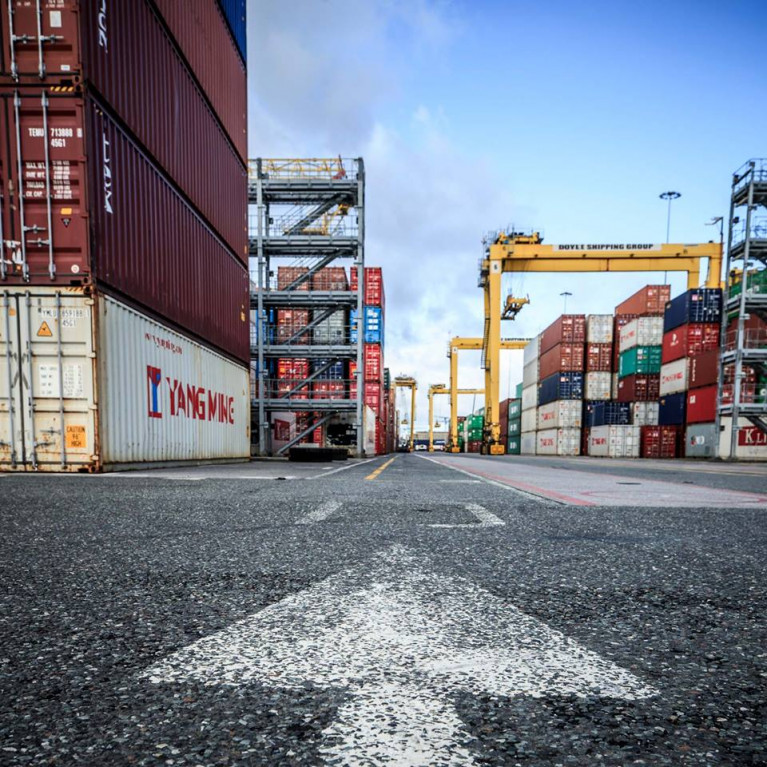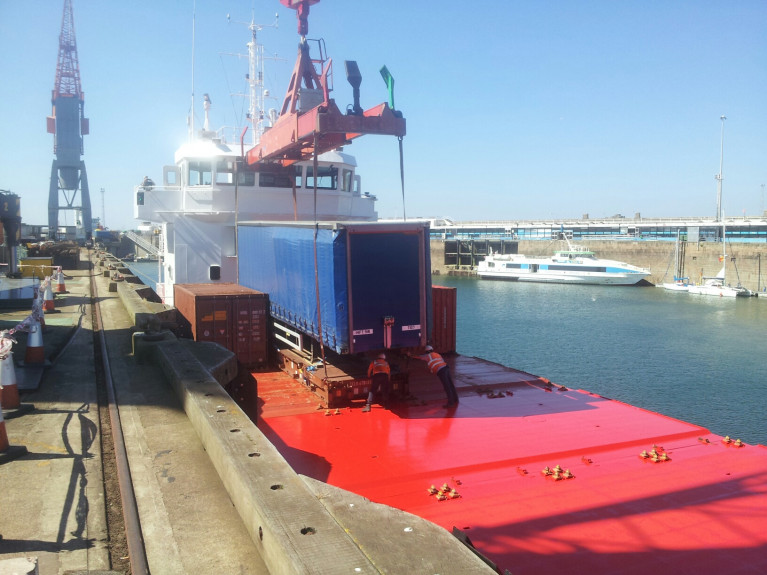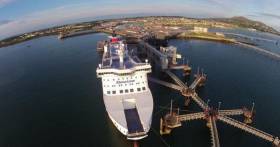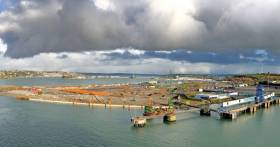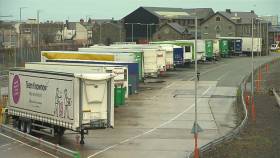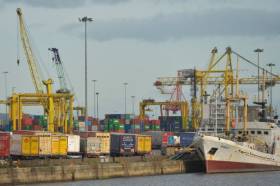Displaying items by tag: NoDeal Brexit
Government to Hear Contingency Planning for No-Deal Brexit
According to RTE News, it is expected the analysis will cover contingency planning for both a trade agreement being reached between the EU and UK, as well as a no-deal scenario.
Mr Coveney said the stakes are really high and "what we are doing as a Government is making sure that we are fully prepared for all scenarios".
In London, British Prime Minister Boris Johnson, asked whether he was hopeful of a Brexit deal, told reporters at a London hospital this morning: "I'm always hopeful... yes, I am very hopeful, but I've got to be honest with you I think the situation at the moment is very tricky."
Minister for Public Expenditure Michael McGrath, speaking on his way into Cabinet, said he is still hopeful a post-Brexit trade deal can be reached saying where "there's a will there's a way".
Mr McGrath said he thinks that it is a positive that European Union President Ursula von der Leyen and Mr Johnson are to meet later this week.
"We all know what the economic consequences are of no trade deal. For Ireland alone we are looking at potentially tariffs of up to €1.7 billion on our exports to the UK, with over 90% of that falling on the agri food sector. So the stakes are really high," Mr McGrath said.
It is understood that among the measures Cabinet will hear today is a plan to ensure that Covid-19 vaccines come to Ireland directly via EU ports, rather than through the UK land-bridge, in order to guarantee delivery.
In the past month there has been a further increase in the number of Irish businesses signing-up for required certification to trade with the UK, post-Brexit.
The latest data suggested 97% of exporters and 94% of importers now have an Economic Operators Registration and Identification number.
More including French fisheries as part of the Brexit talks, click here.
Deal or No-Deal: Irish Flagged Cargoship from Cork Dockyard Heads to UK's 'Ferry' Brexit Waters
So where next? Afloat posed the question after the Irish flagged Huelin Dispatch departed Cork Dockyard last week and to initially anchor offshore prior to the ship's arrival in UK waters this week, writes Jehan Ashmore.
The Dundalk Shipping (DSC) Co Ltd owned Damen Combi-freighter after the dry-docking had for several days in Irish waters awaited orders from a charterer while off the mouth of Cork Harbour.
Now the cargoship is in the southern North Sea at Deal Anchorage off the east Kent coast. Deal is located where the English Channel meets the North Sea and is located equidistant between Dover (Britains busiest ferryport) and Ramsgate. Both ports are 8 miles apart of Deal.
This evening the aids to navigtion tender THV Patricia of Trinity House which departed their main marine depot in Harwich, Essex is too anchored off Deal though the Irish cargoship lies closer to Walmer as explained further below.
Huelin Dispatch had sailed through the English Channel and a transit of the Strait of Dover before taking anchorage offshore off Deal which took place on Monday night. The repositioning voyage might suggest the anchorage is more suited in a sea region geographically closer to numerous central north-west Europe ports and hence advantageous when the charterer recieves a call for further orders.
Nearby of Deal to the north is the Port of Ramsgate where in early 2019, the port hit the UK national headlines as one of several ports proposed to serve the UK in the event of a 'No-Deal' to secure essential and additional freight capacity with the EU and the rest of mainland Europe.
In a package announced in 2018 by the UK Government costed at £108m were contracts to French operator, Brittany Ferries, the Danish giant DFDS and Seaborne Freight to launch a service to Belgium by reviving the Ramgate-Ostend service subsequently cancelled.
However, The UK Transport Secretary reported Channel 4 News, faced controversary and calls for his resignation last year after the cancellation of a £14 million contract with ferry company Seaborne Freight. The government pulled the rug on the contract after revealing that Arklow Shipping – a firm which was set to be a majority shareholder in Seaborne – had itself backed out.
Channel 4 News also revealed that that company had never agreed any contract and blamed the UK government for pushing the deal through too fast.
Overall the most bizarre aspect of the story is that Seaborne Freight glaringly never traded nor had any ferries for that matter and therefore experience in running any such operation.
By coincidence the British game show, Deal or No Deal hosted by Noel Edmonds, was broadcast by Channel 4 for just over a year until it ceased in December 2016.
In that same year, ASL was a client of Cork Dockyard with the call of Arklow Rose, following the closure of Dublin Graving Docks Ltd with Arklow Fame becoming the last 'merchant' ship. The 220m graving dry-dock however was afterwards temporaily used for work on the 'static' museum timber built tallship Jeanie Johnston based on the nearby river Liffey.
As for Cork Dockyard which in 1995 was acquired by the Doyle Shipping Group (DSG) though the facility in Rushbrooke near Cobh is branded as the marine repair division in the Cork based shipping group.
Until recent years, Cork Dockyard has its own dedicated website, but it would appear for corporate rebranding purposes now forms part of the group's website of diverse shipping operations. Among them is shipping agency services with offices in all main Irish ports north and south.
As Afloat previously highlighted Cork Dockyard had among previous owners, the Damen Group which built Huelin Dispatch for Dundalk Shipping in 2012 at Bergum in the Netherlands. It is in that nation where at a shipyard in Schiedem where Townsend Thoresen Ferries (TTF) had also custom built the Free Enterprise VII completed in 1973, firstly to operate on the Dover-Calais/Boulogne Zeebrugge routes.
As for the present where Huelin Dispatch is in fact at anchorage closer to the other coastal Kent town of Walmer, where ferry aficionado's will note this location was the place name given to the renamed TTF ferry. That been the Pride of Walmer which continued to serve on the Strait of Dover but understood only to have operated to the Belgium port.
Before re-entering service, the ferry was radically rebuilt in Germany and not for the better at least in terms of exterior aesthetics and to put it politely, the ship emerged with a most ungainly appearance.
The 'Walmer' by 1987 was officially registered as part of new owners P&O Ferries which renamed the ferry Pride of Rathlin reflecting the route it was transferred to closer to home. This was the North Channel link of Larne-Cairnryan where the almost 30 year old ferry would remain until withdrawn from the Northern Ireland-Scotland run in late 2000.
Another ferry related connection with Huelin Dispatch as it lays offshore of Kent is that Deal too was also used to form part of a ferry renaming in the case of Brittany Ferries Poole-Cherbourg route ferry Barfleur. This arose following a short charter of the English Channel route ferry to DFDS Seaways in 2012 which saw the Deal Seaways emerge on the Dover-Calais route but the French flagged ferry returned to routine duties and regained its original name.
Barfleur would criss-cross the path of Huelin Dispatch when DSC chartered their first custom built cargoship with the inaugural charter to Channel Island Lines. Afloat will have more to report on the current status of the ferry given the Covid-19 crisis and CIL.
The Huelin Dispatch had operated regular freight services out of Southampton to Guernsey and Jersey, however in more recent times Afloat tracked the ship trading in Scandinavian waters prior to the recent dry-docking.
UK's Second Biggest Ferry Port of Holyhead 'Absolutely Not' Ready for a No-Deal Brexit
The UK's second biggest roll-on roll-off ferry port of Holyhead is from where Gwynedd Shipping operate and say they are "absolutely" not ready for a no deal Brexit.
Andrew Kinsella, Managing Director of the shipping company speaking on ITV News, (see: footage) says the infrastructure they need to avoid a backlog of lorries on the A55 is not in place and it is "implausible" that it will be in time.
Stena Line, the company who manage the port in Holyhead claim they "have taken all prudent steps" to prepare for a no deal Brexit.
Welsh Government have also said in the event of a no-deal, there are likely to be delays at customs but contingency plans are in place to minimise disruption.
Boris Johnson has indicated he wants a deal largely in place by October 11, the day the agenda is set for the European summit on October 18 when the Prime Minister is hoping EU leaders will sign off on an agreement.
Michael Gove, the minister in charge of no-deal Brexit preparations (yesterday) announced, "if the EU does not move this Government is prepared to leave without a deal on October 31."
For much more from the ITV News coverage click here.
Fianna Fáil Leader Says No Deal Brexit Live Possibility
Fianna Fáil leader Micheál Martin has said a no deal Brexit is now a live possibility and his party would honour its promise to continue with the Confidence and Supply Agreement to provide stability.
However Mr Martin speaking on RTE News commented that the Government's plans to deal with a hard Brexit are not adequate.
He said that mayhem would ensue at Dublin Port if there was a no deal Brexit because the port is not ready.
Mr Martin said Government continue to "huff and puff" and insist they are ready but they are not.
He added that if there is a disorderly Brexit, it is important to have all hands on deck to ensure that people's jobs are protected.
For more on yesterday's RTE report, click here for link for footage of the FF leader.
Afloat adds also yesterday the Dublin Port Company published their second quarter (pdf) Trade Statistics for 2019.
For the most up to date figures on imports, exports, tourism and more click here in addition to read the report in full.
Noting other quarterly figures are available to download dating back to Q1 of 2015.
Irish Sea: No-Deal Brexit ‘Would Have Severe Impact on Trade between Dublin and Holyhead
The Irish Examiner writes that the Taoiseach has said that a no-deal Brexit would have a severe impact on the Holyhead/Dublin trade route.
Speaking at the 20th anniversary of the British-Irish Council (BIC) in Manchester, Leo Varadkar said Ireland would have to impose tariffs on goods entering the state from the UK.
“I think in the event of a no-deal Brexit, there would be a very severe impact on trade between Dublin and Holyhead,” he said.
“In the first instance, we would have to impose tariffs on all goods being imported into Ireland from the UK and we would have to put in place the necessary customs checks and controls, and we have the infrastructure in place at Dublin Port and the staff to do that but we really don’t want to do it.”
Likewise, First Minister of Wales Mark Drakeford said his government would prepare for all eventualities.
More on the can be read here.
#ferries - Only 10% has been put up by the Government of the cost of contingency plans being set up to avoid major disruption at one of the UK’s main cross-Channel ports in the case of a no-deal Brexit.
As the Irish Examiner writes, Mike Sellers, the director of Portsmouth International Port, said that emergency plans had been prepared in case a deal was not agreed with the EU.
But he said the Department for Transport (Dft) was refusing to acknowledge there was an issue at the Hampshire port.
Mr Sellers explained that with only 13 lorry lengths between the port and the motorway network, any delays at the border through new customs checks would cause congestion on the main route connecting the Hampshire island city.
Mr Sellers said that the Hampshire and Isle of Wight Local Resilience Forum (LRF) had developed a plan for two lorry triage processing points to be created, one at the edge of Portsmouth and the other on the A31 near Winchester, to streamline arrivals at the port.
But he said the cost of setting up the system required in a no-deal situation was £4 million while the Government had only provided £345,000 in funding.
The newspaper has more here on the major UK ferryport.
#portofCork - One or two ferry services, reports The Irish Times, could be run through the Port of Cork to the UK should a no-deal Brexit lead to congestion at Dublin Port, according to the executive of the southern port.
Brendan Keating, Port of Cork chief executive, said the port could handle a ferry service or two to the UK – most likely to Fishguard, Swansea or Bristol for eight to 12 weeks after a no-deal Brexit – but said the port would need more than €500,000 to make the necessary preparations, depending on traffic volumes.
“All we can do is plan for the worst scenario and, in that context, if a hard Brexit comes to pass we can step up to the plate and facilitate an additional service or two,” Mr Keating said.
Department of Transport briefing papers identify Rosslare Europort and the Port of Cork at Ringaskiddy to be used potentially to take roll-on, roll-off (RoRo) lorry traffic from Dublin Port, which handles more than 85 per cent of the country’s road freight, should checks in a no-deal scenario lead to a backlog.
For further reading on Contingency Plans click here.
Brittany Ferries Moves to Reassure English Channel Passengers In Event of No-Deal Brexit
#ferries - Brittany Ferries last week released a statement (below) to reassure passengers concerned by changes following the UK Government's £108m spending initiative to use ferries to ease potential problems in the event of a no-deal Brexit.
The French operator highlighted to schedules on three of its English Channel routes. All affected passengers will be rebooked onto alternative services. In the vast majority of cases, this involves a change to departure time on the same day of travel.
It does not mean that the booking has been cancelled and that no alternative sailing will be provided by Brittany Ferries.
Furthermore, the company would like to make clear that passengers can book crossings to France and Spain, and sail-and-stay holidays as normal. There is absolutely no truth in speculation that passengers are being advised not to book because all space has been allocated to freight.
The reality is that Brittany Ferries has added 19 crossings on three of its nine routes leaving the UK. The additional sailings create more space for freight, as requested by the Department for Trnsport (DfT). As a consequence, there is now more choice for passengers rather than less, albeit departure and arrival times may have changed.
This does not mean that holidays have to be cancelled, that future bookings cannot be made or that there is any material change to Brittany Ferries business model: we are and will remain a predominantly passenger service and look forward to welcoming everyone on board.
For further information as to which routes and ferries are affected click here.
Worries Expressed by Truck Drivers Over No-Deal Brexit
#ferries - Deep concerns have been expressed by Irish hauliers that a no-deal or hard Brexit will lead to unworkable delays at UK ports.
They are already delivering huge quantities of non-perishable goods which are being stockpiled in both Ireland the UK amidst fears of Britain crashing out of the EU.
Speaking on RTÉ's The Week in Politics on the way to Holyhead in Wales, a number of drivers expressed fears that delays of 24 to 48 hours currently experienced at customs posts on non-EU borders could be replicated at the UK border.
Up to 1,000 Irish trucks travel by ferry from Dublin Port to Holyhead every day - it is the shortest and busiest crossing between Ireland and Wales.
According to the Irish Road Haulage Association, 70% of the haulage traffic leaving Dublin on ferries use the UK as a land-bridge to continental Europe.
To read opinions of truck drivers using the core Irish Sea route, click here.
Dublin Port: How Is It Preparing For a Possible No-Deal Brexit?
#ferries - On top of the roof of Dublin Port Company's headquarters, you can see lots of building work amidst all the docked ships at the River Liffey's mouth.
And while that construction is not entirely Brexit-related, management at the port, BBC News reports, says it has to be prepared for the possibility of a no-deal and any potential economic fallout.
The UK is scheduled to leave the EU on 29 March, whether or not there is a negotiated deal. British Prime Minister Theresa May is hoping that her draft Withdrawal Agreement will get through the House of Commons, but preparations are under way in case it does not.
There is agreement across Irish society that Brexit will have an adverse effect on the country, but the worst scenario as far as the Irish government is concerned is that the UK leaves without a negotiated settlement. Politicians here refer to that option as a "hard" Brexit.
The International Monetary Fund forecasts that Ireland's economic growth would take a 4% hit "in the long run" if there is a "cliff-edge" break with the EU, because of the highly integrated nature of the Irish and UK economies.
And the independent Dublin-based think tank The Economic and Social Research Institute estimates that a "hard" Brexit could cost households up to €1,400 (£1,260) a year, because of a potential increase in food prices and possible trade tariffs.
Despite no-one in authority being in a position to predict how Brexit will unfold, the Irish government has already announced plans for an extra 1,000 customs and veterinary staff to work at Dublin and Rosslare ports and at airports, as well as new money to train people in sectors likely to be badly affected.
It has organised a series of very well-attended roadshows around the country with the involvement of state agencies with the theme "Getting Ireland Brexit Ready" for every Brexit scenario.
And there is evidence that more companies - worried about possible delays and resulting costs at Dover - are forsaking the UK land-bridge (incl. Holyhead) and for the new "Brexit-busting" super-ferries (see Afloat's report) that would sail directly between Dublin and Zeebrugge and Rotterdam, bypassing uncertainty in Britain.
It is too early to say what impact they are having, but the development is seen as significant.
There is an Irish political and economic consensus on Brexit.
For political reasons there is widespread agreement that there has to be a so-called "backstop" unless and until there is a wider trade agreement to avoid a hard border on the island of Ireland.
It is feared that such a border could risk a return to violence after a hard-won peace.
For much more click here.


























